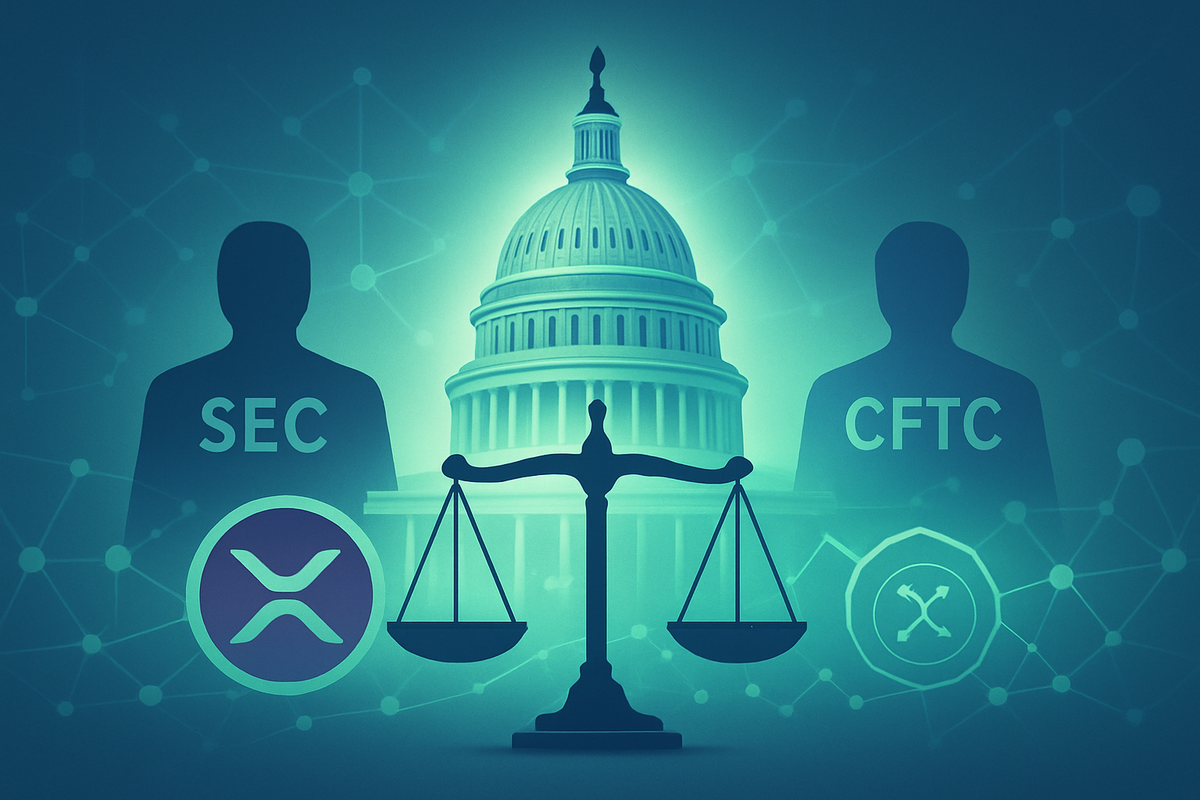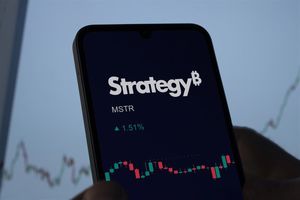
Washington D.C., November 11, 2025 – A pivotal moment is unfolding in the United States Senate, with bipartisan legislative efforts gaining significant traction to classify XRP (XRP) as a digital commodity, thereby placing it under the regulatory purview of the Commodity Futures Trading Commission (CFTC) rather than the Securities and Exchange Commission (SEC). This proposed reclassification represents a monumental shift in the regulatory landscape for digital assets, promising to bring much-needed clarity to an industry long plagued by jurisdictional ambiguity.
The implications of such a bill are immediate and profound, particularly for Ripple Labs, the company associated with XRP, and the broader cryptocurrency market. It signals a potential end to the protracted legal uncertainties surrounding XRP's status, offering a clearer path for innovation and investment. For the wider crypto ecosystem, this move could set a powerful precedent, fostering a more stable and predictable environment for digital asset development and adoption within the United States.
A New Era of Regulatory Certainty: Detailing the Legislative Push
The legislative push to redefine digital asset regulation has been building momentum, culminating in significant bipartisan efforts within the US Senate. Key among these are initiatives led by Senators John Boozman and Cory Booker, who have introduced legislation aimed at transferring primary regulatory authority for most cryptocurrency markets from the SEC to the CFTC. This aligns with earlier legislative endeavors, such as the House's CLARITY Act, and is further solidified by the draft "Digital Commodities Regulation Bill" and the broader "Responsible Financial Innovation Act of 2025." These bills collectively seek to establish a comprehensive framework that explicitly categorizes assets like XRP as digital commodities.
The timeline leading up to this moment has been characterized by intense debate and legal battles, most notably the SEC's lawsuit against Ripple Labs (XRP) alleging that XRP was an unregistered security. This ongoing legal saga has underscored the urgent need for clear legislative guidance. The industry has long advocated for regulatory certainty, arguing that the existing framework is ill-suited for the unique nature of digital assets. The current legislative efforts are seen as a direct response to this call, with reports suggesting a White House deadline for such legislation to reach the President's desk by the end of 2025. This indicates a strong political will to resolve the long-standing jurisdictional disputes between the SEC and CFTC.
Key players involved in this legislative drama extend beyond the senators themselves to include the SEC, which has historically asserted broad jurisdiction over digital assets, and the CFTC, which is poised to expand its oversight significantly. Ripple Labs (XRP), as the issuer of XRP and the central figure in the SEC lawsuit, stands to be the most directly impacted corporate entity. Initial market reactions have been cautiously optimistic, with many in the crypto community viewing the potential reclassification as a significant de-risking event for XRP and a positive step towards mainstream adoption of digital assets. The CFTC has reportedly already listed XRP under Rule 13.43, functionally positioning it alongside established commodities like Bitcoin (BTC) and Ethereum (ETH), further signaling the direction of regulatory intent.
Market Winners and Losers: The Impact on Public Companies
The potential classification of XRP as a commodity under CFTC oversight would send significant ripples through the financial markets, creating clear winners and losers among public companies and the broader cryptocurrency ecosystem.
The most prominent winner would undoubtedly be Ripple Labs (XRP) itself. For years, the company has been embroiled in a high-stakes legal battle with the SEC, which has cast a long shadow over its operations and the market value of XRP. A legislative classification of XRP as a commodity would effectively nullify the SEC's core argument, providing Ripple with immense regulatory clarity. This would not only resolve the protracted lawsuit but also allow Ripple to operate and expand its cross-border payment solutions, which leverage XRP, without the constant threat of regulatory enforcement. Such clarity is expected to reignite investor confidence in XRP, potentially leading to significant price appreciation and enabling Ripple to pursue new partnerships and market opportunities within the U.S.
Beyond Ripple, several cryptocurrency exchanges and financial institutions stand to gain. Exchanges like Coinbase Global, Inc. (NASDAQ: COIN), which delisted or restricted XRP trading due to the SEC lawsuit, could relist the asset with renewed confidence. This would increase trading volume and liquidity for XRP, benefiting these platforms. Similarly, financial technology companies and payment providers that have been hesitant to integrate XRP into their services due to regulatory uncertainty may now find a clear path forward, potentially boosting their offerings and market reach. The increased institutional participation that regulatory clarity brings could also benefit companies involved in crypto custody, trading infrastructure, and other ancillary services.
Conversely, companies that have benefited from the regulatory ambiguity or those whose business models rely on a more restrictive interpretation of digital assets as securities might face adjustments. While there aren't direct "losers" in the traditional sense, the shift in regulatory power could mean a re-evaluation of strategies for some. For example, some legal firms specializing in securities law for crypto might see a shift in the nature of their caseload. More broadly, the SEC's reduced jurisdiction over a significant portion of the crypto market could necessitate internal restructuring and a refocus on truly security-like digital assets. However, the overall sentiment is that regulatory clarity, even if it redefines some roles, is ultimately beneficial for the market's long-term health and growth, making outright "losers" less likely than those requiring strategic adaptation.
A Broader Horizon: Wider Significance and Industry Trends
This potential legislative reclassification of XRP is far more than an isolated event; it is a critical milestone within the broader narrative of digital asset regulation in the United States and globally. It signals a decisive move towards establishing a functional regulatory framework that differentiates between digital commodities and digital securities, a distinction that the crypto industry has long argued is essential for fostering innovation without stifling growth. This event fits squarely into a global trend where various jurisdictions are grappling with how to integrate digital assets into existing financial laws, often struggling with the limitations of legacy definitions.
The ripple effects of such a bill would be extensive. If XRP is definitively classified as a commodity, it could set a powerful precedent for other cryptocurrencies currently in a state of regulatory limbo. This might encourage other digital asset projects to seek similar classifications, potentially reducing the SEC's perceived overreach and strengthening the CFTC's role as the primary regulator for the vast majority of cryptocurrencies. This shift could lead to a more harmonized regulatory approach, reducing the likelihood of future lawsuits and fostering a more predictable environment for development and investment. Competitors and partners in the blockchain space would benefit from clearer rules of engagement, potentially unlocking new collaborations and market expansions.
From a regulatory and policy perspective, this move represents a significant rebalancing of power between the SEC and the CFTC. While the SEC will retain jurisdiction over assets clearly defined as securities, the CFTC's expanded authority over digital commodities will necessitate closer coordination and a clearer delineation of responsibilities between the two agencies. This could lead to a more mature and specialized regulatory landscape for digital assets. Historically, the U.S. has often lagged behind other nations in providing clear crypto regulations, leading to a "brain drain" of talent and innovation. By drawing a clear line in the sand, this legislation could position the U.S. as a more attractive hub for blockchain innovation, potentially rivaling jurisdictions that have already established clearer frameworks. This move can be compared to the early days of the internet, where regulatory clarity, or lack thereof, significantly shaped its development and adoption.
The Road Ahead: Navigating Future Possibilities and Challenges
The passage of a US Senate bill classifying XRP as a commodity would usher in a new era for the digital asset market, presenting both short-term and long-term possibilities, as well as new challenges. In the short term, the most immediate impact would be a surge in market confidence for XRP and potentially other digital assets that have faced similar regulatory ambiguities. We could see a rapid influx of institutional capital, as the removal of regulatory uncertainty makes these assets more palatable for traditional financial players. Exchanges that previously delisted XRP would likely relist it, increasing liquidity and accessibility.
Looking further ahead, the long-term possibilities are transformative. Regulatory clarity could spur a wave of innovation within the blockchain space, as developers and companies can build new products and services without fear of sudden enforcement actions. This might lead to the development of new financial instruments, such as XRP spot Exchange-Traded Funds (ETFs), which would further legitimize the asset in mainstream finance. Companies like Ripple Labs (XRP) would be able to pursue strategic pivots, focusing on expanding their utility and partnerships globally, particularly in the critical U.S. market. This could lead to increased adoption of XRP for cross-border payments and other enterprise solutions.
However, the path forward is not without its challenges. The new regulatory framework, while clearer, will still require robust compliance from market participants. Companies will need to adapt their operations to meet CFTC standards, which, while potentially less burdensome than SEC securities regulations, still demand significant oversight and reporting. There could also be ongoing debates about the precise definitions of what constitutes a digital commodity versus a digital security, especially for novel assets that emerge in the future. Market opportunities will abound for those who can navigate the new regulatory landscape effectively, offering services that assist with compliance, custody, and institutional access. Conversely, firms unwilling or unable to adapt might find themselves at a disadvantage. The ultimate outcome will depend on the precise details of the enacted legislation and the ongoing interpretation and enforcement by the CFTC.
A Watershed Moment: Summary and Future Outlook
The potential classification of XRP as a commodity by a US Senate bill marks a watershed moment for the digital asset industry. It represents a significant step towards resolving the long-standing regulatory quagmire that has hindered innovation and investment in the United States cryptocurrency market. The key takeaway is the shift towards greater regulatory clarity, a demand echoed by industry leaders and investors alike for years. This move is expected to largely de-risk XRP, providing Ripple Labs (XRP) with a clear operational path and potentially unlocking significant market value for the asset.
Moving forward, the market is poised for a period of adjustment and, ultimately, growth. The expansion of the CFTC's oversight, coupled with a more defined role for the SEC, promises a more predictable and robust regulatory environment. This clarity is not just beneficial for XRP but could set a crucial precedent for a wide array of other digital assets, fostering a more mature and institutional-friendly crypto ecosystem in the U.S. Investors should closely watch the final legislative text, the speed of its implementation, and the subsequent actions of both the CFTC and the SEC.
The lasting impact of this legislative action could be profound, positioning the United States as a more competitive and attractive jurisdiction for blockchain innovation. It signals a maturation of the digital asset market, moving beyond its speculative early days into a phase where regulatory frameworks enable sustainable growth and mainstream adoption. The coming months will be critical in observing how the industry adapts to these new rules, how institutional capital flows in, and how this foundational change influences the global cryptocurrency landscape.
This content is intended for informational purposes only and is not financial advice






